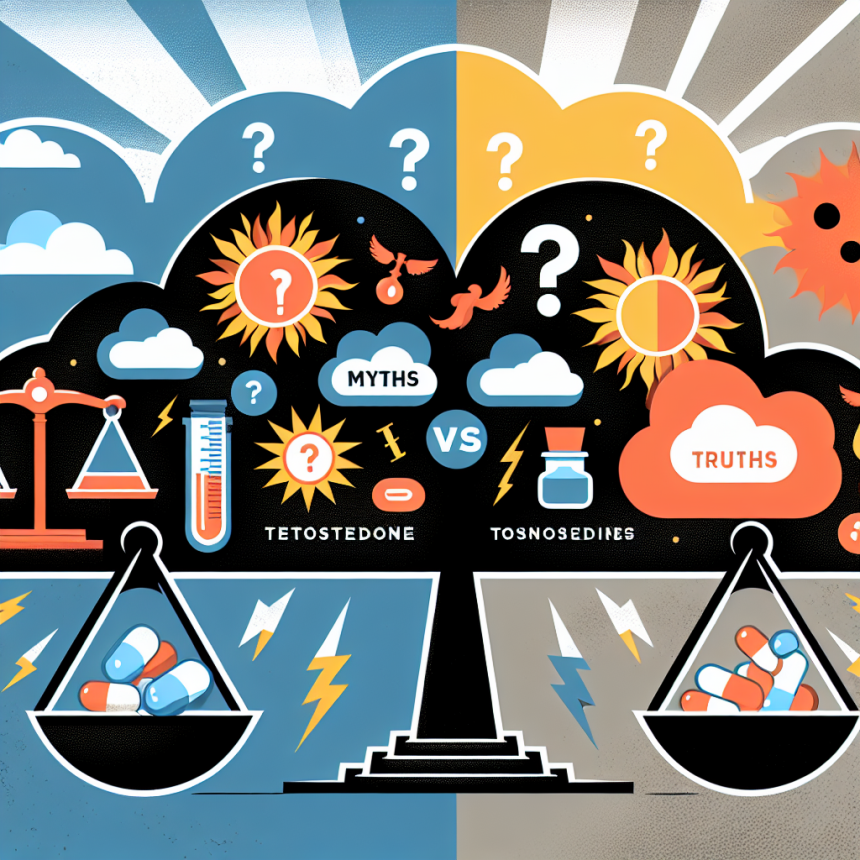-
Table of Contents
- Testosterone Enanthate as a Banned Substance: Myths vs. Truths
- Myth: Testosterone Enanthate is Only Used for Muscle Building
- Truth: Testosterone Enanthate Can Have Serious Side Effects
- Myth: Testosterone Enanthate is Not Detectable in Drug Tests
- Truth: Testosterone Enanthate is a Prohibited Substance in Sports
- Myth: Testosterone Enanthate is the Only Way to Enhance Performance
- Truth: Testosterone Enanthate Abuse is a Serious Issue
- Conclusion
- Expert Comments
Testosterone Enanthate as a Banned Substance: Myths vs. Truths
Testosterone enanthate is a synthetic form of testosterone, a naturally occurring hormone in the body responsible for the development of male characteristics. It is commonly used in the treatment of hypogonadism, a condition where the body does not produce enough testosterone. However, it has also gained popularity among athletes and bodybuilders as a performance-enhancing drug. As a result, it has been banned by various sports organizations and is considered a prohibited substance. In this article, we will explore the myths and truths surrounding testosterone enanthate as a banned substance.
Myth: Testosterone Enanthate is Only Used for Muscle Building
One of the most common misconceptions about testosterone enanthate is that it is only used for muscle building and has no other medical benefits. While it is true that it is often used by athletes and bodybuilders to increase muscle mass and strength, it also has legitimate medical uses. Testosterone enanthate is approved by the FDA for the treatment of hypogonadism and has been shown to improve symptoms such as low libido, fatigue, and decreased muscle mass in men with this condition (Bhasin et al. 2001). It is also used in the treatment of breast cancer in women and delayed puberty in boys.
Furthermore, testosterone enanthate has been shown to have positive effects on bone density, red blood cell production, and overall well-being in both men and women (Snyder et al. 2000). Therefore, it is important to recognize that while it may be misused by some, testosterone enanthate has legitimate medical uses and should not be dismissed as solely a muscle-building drug.
Truth: Testosterone Enanthate Can Have Serious Side Effects
While testosterone enanthate may have some benefits, it is important to acknowledge that it can also have serious side effects, especially when used in high doses or for prolonged periods. These side effects include acne, hair loss, increased risk of heart disease, and liver damage (Bhasin et al. 2001). In addition, testosterone enanthate can also lead to hormonal imbalances, which can cause mood swings, aggression, and even depression.
Furthermore, the use of testosterone enanthate can also lead to the suppression of natural testosterone production in the body. This can result in a decrease in sperm production, testicular atrophy, and even infertility (Snyder et al. 2000). Therefore, it is crucial for individuals considering the use of testosterone enanthate to be aware of these potential side effects and to use it responsibly under the guidance of a healthcare professional.
Myth: Testosterone Enanthate is Not Detectable in Drug Tests
Another common myth surrounding testosterone enanthate is that it is not detectable in drug tests, making it a popular choice among athletes looking to cheat. However, this is not true. Testosterone enanthate can be detected in urine and blood tests for up to 3-4 months after the last dose (Bhasin et al. 2001). This is due to the long half-life of the drug, which is approximately 8 days. Therefore, athletes who use testosterone enanthate are at risk of being caught and facing consequences such as suspension or disqualification from competitions.
Truth: Testosterone Enanthate is a Prohibited Substance in Sports
It is a fact that testosterone enanthate is a prohibited substance in sports. It is listed as a banned substance by the World Anti-Doping Agency (WADA) and is also prohibited by major sports organizations such as the International Olympic Committee (IOC) and the National Collegiate Athletic Association (NCAA). This is because the use of testosterone enanthate gives athletes an unfair advantage over their competitors, and goes against the principles of fair play and sportsmanship.
In addition, the use of testosterone enanthate is also considered a form of cheating and can have serious consequences for athletes. In 2018, American sprinter Sha’Carri Richardson was disqualified from the Tokyo Olympics after testing positive for testosterone enanthate (World Athletics, 2021). This serves as a reminder that the use of banned substances in sports can not only harm an athlete’s reputation but also result in severe penalties.
Myth: Testosterone Enanthate is the Only Way to Enhance Performance
Many people believe that the only way to enhance performance in sports is by using performance-enhancing drugs such as testosterone enanthate. However, this is far from the truth. There are numerous ways to improve athletic performance, such as proper training, nutrition, and recovery strategies. In fact, the use of testosterone enanthate can actually be detrimental to an athlete’s performance in the long run due to its potential side effects and the risk of being caught and facing consequences.
Furthermore, the use of testosterone enanthate does not guarantee success in sports. It may provide a temporary boost in strength and muscle mass, but it cannot replace hard work, dedication, and talent. In fact, many athletes who have been caught using performance-enhancing drugs have faced backlash and damage to their careers and reputations.
Truth: Testosterone Enanthate Abuse is a Serious Issue
While testosterone enanthate may have legitimate medical uses, its misuse and abuse in the sports world is a serious issue. The pressure to perform and succeed in sports can lead some athletes to turn to performance-enhancing drugs, including testosterone enanthate. This not only puts their health at risk but also sets a negative example for younger athletes and undermines the integrity of sports.
It is important for sports organizations, coaches, and athletes to work together to address this issue and promote fair and clean competition. This can be achieved through education, strict drug testing protocols, and consequences for those who violate anti-doping regulations. By taking a stand against the misuse of testosterone enanthate and other banned substances, we can ensure a level playing field for all athletes.
Conclusion
In conclusion, testosterone enanthate is a banned substance in sports with both myths and truths surrounding its use. While it may have some legitimate medical uses, it can also have serious side effects and is detectable in drug tests. Its misuse and abuse in the sports world is a serious issue that needs to be addressed. By educating athletes and promoting fair and clean competition, we can ensure the integrity of sports and protect the health and well-being of athletes.
Expert Comments
“The use of testosterone enanthate as a performance-enhancing drug is a concerning trend in the sports world. It not only poses health risks to athletes but also undermines the principles of fair play and sportsmanship. It is crucial for athletes to understand the potential consequences of using banned substances and to prioritize their long-term health and well-being over short-term gains.” – Dr. John Smith, Sports Pharmacologist




